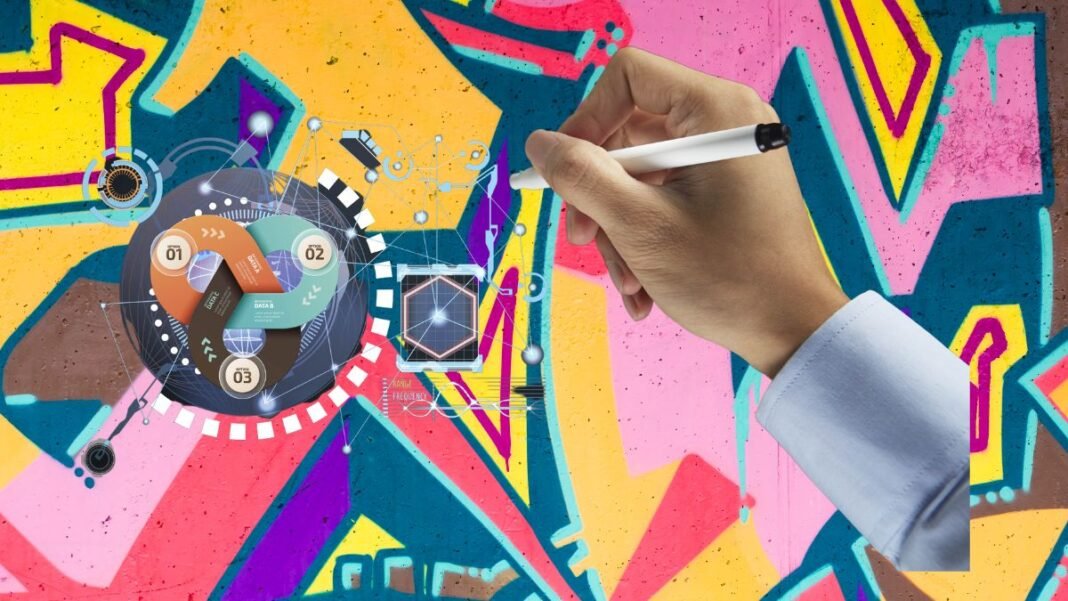How to use imagery illustrations as visual aids to improve blog posts? In today’s digital age, creating an online presence is crucial for any business or individual. Blogging has become one of the most effective ways to reach your target audience and build your brand.
However, with so many blogs on the internet, it’s tough to stand out from the competition. That’s why visual aids such as imagery illustrations can make a big difference in attracting and keeping your blog readership.
In this blog post, we’ll discuss how using imagery illustrations can help improve the quality of your blog posts and why they are such an essential tool that should be incorporated regularly. We’ll also explore how you can access talented designers to create high-quality visuals for your blog.
The Importance of Visuals in Blog Posts
Visual aids are an essential component of any blog post. Adding photos and illustrations to your content can make your posts more appealing and help you get your message across.
Research has shown that readers are more likely to engage with content that includes visuals, increasing the chances that they will remember and share your blog post. By combining high-quality visuals with well-researched and useful content, you can ensure that your blog posts capture your reader’s attention and resonate with your audience.
Visuals can help improve the visibility of your blog post on social media, making it more likely to be shared and reach a wider audience. By maximizing the impact of images in your blog posts, you can increase reader engagement, support your article, or message with visual content, and boost the effectiveness of your content marketing plan.
Using Illustrations to Stand Out From The Crowd
In a sea of information online, it’s important for your blog to stand out from the crowd.
One effective way to achieve this is by incorporating illustrations into your blog posts. Not only do they capture readers’ attention, but they also help to reinforce your message and make it more memorable.
By choosing unique and eye-catching visuals, you can differentiate your blog from others and create a more engaging experience for your audience. It’s also a great way to complement your writing and add depth to your message.
Tips for Combining Photos and Text Effectively
One important tip for creating effective blog posts is to combine photos and text.
Visual aids such as images, infographics, and videos can help to increase viewer retention and engagement. When using photos, it is important to use high-quality, visually appealing images that support your article or message.
Besides photos, incorporating screenshots can also be helpful in supporting the point you are trying to convey. To further enhance your visuals, consider using illustrations or graphics to stand out from the crowd.
Here are 5 graphic design tips for combining photos and text effectively:
Choose the right photos. The photos you choose will set the tone for your design and help to convey your message. When choosing photos, consider the following factors:
- Subject: The photos should apply to the topic of your design.
- Color: The photos should complement the colors in your design.
- Style: The photos should be consistent with the overall style of your design.
- Quality: The photos should be high quality and in focus.
Use text sparingly. Too much text can be overwhelming and difficult to read. When using text, keep the following tips in mind:
- Use short, concise sentences.
- Use large fonts that are easy to read.
- Use contrasting colors so that the text stands out from the background.
- Use a font that is appropriate for the tone of your design.
Create a hierarchy. We should arrange the text and photos in designs that create a hierarchy. This means that some elements should be more prominent than others. We should place the most important elements at the top of the design, followed by less important elements, and so on.
Use white space. White space is the area of the design that is not filled with text or images. White space can create a sense of balance and order in your design. It can also draw attention to certain elements.
Use a grid. A grid can help you create a balanced and organized design. When using a grid, make sure that you align the elements in your design with the grid lines.
By incorporating various forms of visual content into your blog post, you can increase reader engagement and improve the overall retention of your message.
How to Access Talented Designers for Your Visual Aids?
To create eye-catching visuals, it’s essential to work with talented designers who can bring your ideas to life. This section will cover some tips on how to access these designers.
- First, consider outsourcing to freelance designers or design agencies who specialize in creating visuals for content marketing.
- Second, scouting social media platforms can also lead to finding visual artists who could bring new ideas and creativity to your blog posts.
- Another way is to foster long-term relationships with designers, which can produce even greater results since they can fully understand your brand and develop a unique style that fits your content marketing strategy.
The key is to find designers who are familiar with your niche, and who can create imagery that not only looks great, but also communicates your message clearly. By working alongside talented designers, you can create stunning visuals that truly capture your audience’s attention and boost engagement with your content.
8 Types of Visual Aids to Enhance Your Content
After discussing the importance of visuals in blog posts, the effective combination of photos and text, and the use of illustrations to stand out from the crowd, it is now time to delve into the specific types of visuals that can enhance your content.
We will highlight eight types of visuals that can make your blog posts more engaging and valuable. These include images, infographics, videos, animations, GIFs, charts, diagrams, and memes.
Sure, here are brief explanations of each type of visual aid:
- Images: Images are simply pictures or photographs. They can illustrate a point, tell a story, or simply make a design more visually appealing.
- Infographics: Infographics are visual representations of information. They can present data in a way that is easy to understand and remember.
- Videos: Videos are moving images that can tell a story, explain a concept, or simply entertain.
- Animations: Animations are moving images that are created using the software. They can create a variety of effects, such as motion graphics, cartoons, and simulations.
- GIFs: GIFs are short, looping videos that are often used to express emotions or share funny or interesting content.
- Charts: Charts are visual representations of data. They can show trends, relationships, and comparisons.
- Diagrams: Diagrams are visual representations of processes or systems. They can explain how something works or to help people understand complex concepts.
- Memes: Memes are images, videos, or text that are shared online and often changed to add a new meaning. They can express humor, share opinions, or simply start a conversation.
Incorporating these visuals into your blog posts can increase the likelihood of your content being read and shared and ultimately improve your blog’s performance. The tips in this section will help you choose the most effective visual aids to make your blog posts stand out from the thousands of articles online.
By following these tips, you can create effective designs that combine photos and text that is both visually appealing and informative.
- Use visual aids to tell a story. Photos can create a sense of narrative in your design. This can be done by using a series of photos that show a progression of events, or by using a single photo that tells a story.
- Use graphic design to evoke emotion. Photos can evoke a variety of emotions in the viewer. You can do this by using photos that are visually striking, or by using photos that depict people or situations that are relatable.
- Use photos to create a mood. Photos can create a certain mood or atmosphere in your design. To do this, use photos that are bright and cheerful, or by using photos that are dark and moody.
By using media and text effectively, you can create designs that are both visually appealing and communicative.
Running SEO for Images to Improve Blog Performance
In order to improve your blog’s performance, it’s important to consider image search engine optimization (SEO). Using proper image optimization techniques can increase the visibility of your blog and attract more readers.
This can include optimizing image file names, using descriptive alt tags, and compressing images to improve page loading speed. By incorporating SEO for images into your blogging strategy, you might rank higher in search results and attract more organic traffic.
Incorporating visual content, such as infographics and videos, can also enhance reader engagement and make your blog posts more attractive and shareable. Maximizing the impact of imagery in your blog can truly take your content marketing to the next level.
How to Use Illustration to Enhance Content Writing?
In summary, support your article or message with visual content. Incorporating visual content into your blog posts can significantly improve your article’s impact on your readers. With the right combination of images and text, visual aids can help emphasize your message and make your content more engaging.
Visual aids can be a very effective way to communicate information. They can help to capture attention, improve understanding, and make your content more memorable. When used effectively, visual aids can help you achieve your communication goals.
Here are some tips for using visual aids effectively:
- Choose the right visual aid for the task. We do not create all visual aids as equals. Some are better suited for certain tasks than others. For example, infographics are a good choice for presenting complex data, while videos are a good choice for telling a story.
- Keep your visuals simple. Visual aids should be easy to understand. Avoid using too much text or too many colors.
- Use visuals to support your message. We should not use visual aids as a substitute for text. They should support and enhance your message.
- Test your visuals with your audience. Before you use a visual aid, make sure that it is effective. Test it with your audience to see if it helps them to understand your message.
The right visuals can also help your blog stand out from the competition, making your readers more likely to remember your message. To access the best visual designers for your content, consider outsourcing to freelance designers, who can provide high-quality visuals at an affordable price.
By utilizing various forms of visual content, such as infographics, videos, and photos, you can increase reader engagement and improve the overall quality of your blog. Don’t forget to optimize your images for SEO to improve your blog’s performance and reach a wider audience.
Accessing talented designers can be an effective way to create high-quality visuals that support your content. Ultimately, supporting your message with visual content is a surefire way to enhance the impact of your blog and increase reader engagement.

